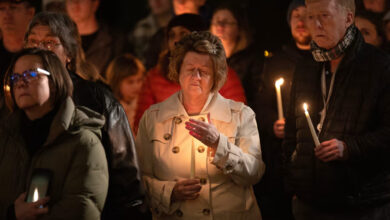Since the toppling of Hosni Mubarak in February, many Coptic Christians have begun making plans to leave the country, fearing instability and the rising power of Islamist political groups.
Lawyers who specialize in working with Coptic Egyptians, who account for around 10 per cent of the country’s 80 million citizens, say that in the past few weeks they have received hundreds of calls from Copts wanting to leave Egypt.
Naguib Gabriel, a prominent Coptic lawyer and head of the Egyptian Federation of Human Rights, said his office had been receiving at least 70 calls per week from people wanting to know how they can emigrate.
“Every day people come to me and ask how they can get to the American or Canadian embassies. They are insisting on leaving Egypt because the risks of staying here are too great," Gabriel said.
“We’re at a crossroads,” he added. “Many Christians are afraid of the future because of the fanatics in the mosques.”
While the Egyptian revolution has remained largely peaceful, especially in comparison to the bloody quagmire developing in neighboring Libya, the period since Mubarak’s ouster has seen vicious bouts of sectarian strife.
At least 15 people, Christians and Muslims, were killed last month in a chain of violence which erupted because of a relationship between a Coptic man and Muslim woman in a village south of Cairo. At least 10 people were killed in similar clashes in the Cairo neighborhood of Moqattam in March.
This led to hundreds of Christians joining a prolonged demonstration outside Cairo’s state television building in a bid to secure better protection for Copts from Egypt’s ruling military council.
In recent days there have also been clashes involving the Salafi movement — a hard-line, literalist Islamic sect that has recently been flexing its political muscle throughout Egypt.
According to recent reports, a Coptic service center in Cairo was closed down last month after being picketed by Salafis, while fights broke out in the Fayoum Governorate south of the capital after the sect tried to force the closure of a shop selling alcohol.
It all seems a far cry from the days when demonstrators in Tahrir Square were declaring, “Muslims and Christians are one hand."
“The issues now are worse than in the past,” said Gabriel. “In the past there were problems, but there were long periods between them. But after the revolution, every day we are seeing new things.”
Mamdouh Nakhla, a Coptic lawyer, said his office was speaking to around 150 people per month who were planning to leave Egypt because of the political situation. Some were Muslims, he said, but most were Copts who felt worried about the prospects of a Brotherhood-dominated government.
“They want to leave to countries where there is freedom of religion,” Nakhla said.
According to both Nakhla and Gabriel, most of the people planning to emigrate want to go to Canada, where there is a large Coptic population of around 50,000. The Canadian Embassy in Cairo said it could not reveal how many Egyptians had applied for visas there since the uprising began.
But Sam Fanous, who runs a company helping Egyptians emigrate and settle in Canada, said that over the past month his office had been “bombarded” with requests from Copts who wanted help in leaving the country.
“I have people coming to my Cairo office until midnight. Often I tell my assistant to shut down the phones because we have so many people calling,” he said. “The majority of people want to emigrate. Some ask about asylum, but I explain they cannot get refugee status from Egypt.”
Fanous said most of the people coming to him were well-off professionals.
“Some want to go and not come back. Some want to take their families and then come back until it becomes time to leave," he said.
But he also said there was a difference in attitude between older Copts he had spoken to and younger generations.
“The young want to fight it out. They were in Tahrir Square and they are not as scared as the older generations,” he said.
Nada Rafik, a 21-year-old Copt from Cairo, said that since the revolution her mother had been making plans to move the family to Canada.
“My mother has been trying to get a Canadian passport for the past year, but since the revolution she’s been saying, ‘let’s try and get this done quickly.'" Rafik said.
Rafik, a financial analyst, said that she would also consider leaving, but only if the situation got much worse. For now, she still embodies some of the revolution’s optimism.
“The older generation are more scared than us,” she said. ”They have lived with Mubarak for 30 years and are used to him. Now they are afraid because they see the Egyptian media talking about the Muslim Brotherhood taking over, but they don’t see the other side really.”




